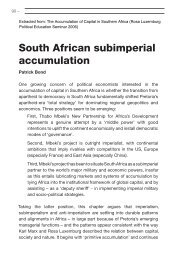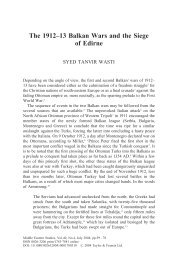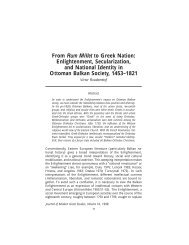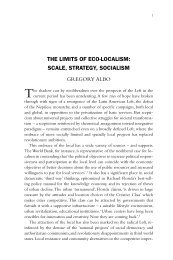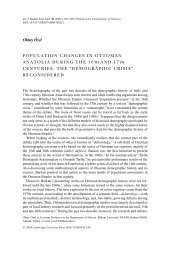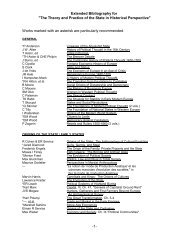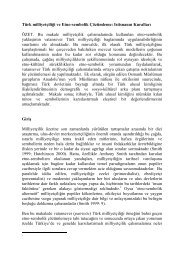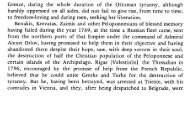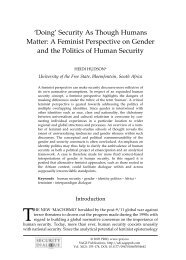Hall, The Balkan Wars
Hall, The Balkan Wars
Hall, The Balkan Wars
You also want an ePaper? Increase the reach of your titles
YUMPU automatically turns print PDFs into web optimized ePapers that Google loves.
THE BALKAN WARS, 1912-1913Serbia, however, with some support from its ally Austria-Hungary, attackedBulgaria later that same year. In the ensuing Serbo-Bulgarian War, theBulgarians successfully defended their unification and administered a sharprebuff to the Serbs. Only the intervention ofAustria-Hungary prevented aBulgarian invasion of Serbia. <strong>The</strong> enmity between these two <strong>Balkan</strong> Slavicstates created an obstacle to the idea of <strong>Balkan</strong> cooperation against the Berlinsettlement and the Ottoman Empire. Nor were relations betweenMontenegro and Serbia conducive toward the realization of national unityDynastic and local rivalries prevented these two Serbian states from mountinga pan-Serb effort against the Ottomans.<strong>The</strong> idea of a <strong>Balkan</strong> alliance extended back to the 1860s, when the Serbiangovernment provided some shelter and assistance for Bulgarian revolutionaries.In 1891, the Greek premier, Kharilaos Trikoupis, had proposed aBulgar-Greek-Serbian alliance. Neither Serbia nor Bulgaria had respondedenthusiastically at that time. <strong>The</strong> Slavic states remained aloof from theirGreek co-religionists because of lack of interest in Greek aspirations in theAegean and because of rivalries with the Greeks over Macedonia. In 1897the Bulgarians and Serbs reached an ephemeral agreement for cooperationin Macedonia.That same year the Greeks made their second assault on the Treaty ofBerlin by attempting to annex Crete. <strong>The</strong> resulting war was over in thirtydays. <strong>The</strong> Ottomans easily deflected the Greek attack. <strong>The</strong> Great Powers,however, intervened to prevent Constantinople from realizing anymeaningful gains from this victory and to maintain the Berlin settlement.<strong>The</strong>y also landed troops in Crete to prevent a Greek occupation and to stopGreek massacres of Moslems. <strong>The</strong> humiliated Greeks did have to cede severalpoints along their frontier in <strong>The</strong>ssaly to the Ottomans. Crete, however,received autonomy under the aegis of a Great Power commission but wasforbidden a union with Greece. <strong>The</strong> Greek failure demonstrated thedifficulties that any one <strong>Balkan</strong> state faced in confronting the fading powerof the Ottoman Empire. It also greatly undermined the confidence of theother <strong>Balkan</strong> states in the abilities of the Greek military.<strong>The</strong> Bulgarians looked to Thrace, the Greeks to the Aegean Islands,especially Crete, and Epirus, the Serbs to Bosnia-Hercegovina, and theMontenegrins to northern Albania as the locations of their aspirations.Bulgarian, Greek, and Serbian claims all overlapped in Macedonia. <strong>The</strong>Ottoman vilayets (provinces) of Salonika and Monastir made up most ofthis fertile region in the center of the <strong>Balkan</strong> Peninsula. All three OrthodoxChristian states considered Macedonia as their own irredenta, based variouslyon cultural, historical, and linguistic claims. Macedonia first became aproblem in 1870, when the Russian government pressured the OttomanTurks to allow the formation of a Bulgarian Orthodox church independentof the Greek Patriarchate in Constantinople. This so-called Exarchateincluded churches in Bulgaria and parts of Macedonia. Eight years later a deBALKAN WAR ORIGINSfacto independent Bulgarian state emerged from the Russo-Turkish War. <strong>The</strong>initial Treaty of San Stefano in March 1878 created a big Bulgaria, whichincluded Macedonia. <strong>The</strong> Treaty of Berlin ofJuly 1878 revised this settlementand returned Macedonia to Ottoman control. Throughout the remainderofthe nineteenth century, the Bulgarians, Greeks, and Serbs contested controlof Macedonia with the Ottoman Turks and among themselves. <strong>The</strong> largestrevolutionary group, IMRO (Internal Macedonian RevolutionaryOrganization) was organized in Salonika in 1893. It adopted the slogan,"Macedonia for the Macedonians," and indeed at times even supported theidea of an autonomous Macedonia within the Ottoman Empire rather thanannexation of Macedonia to Bulgaria. In part to counter IMRO, the Bulgariangovernment established the Supreme Committee or External Organizationin 1895. Even so, the orientation of IMRO was clearly toward Sofia. <strong>The</strong>Greeks organized the Ethniki Etairia in 1894 to further Greek nationalistaims in Macedonia. <strong>The</strong> Serbs had already established the Society of SaintSava back in 1886. All of these groups had educational and propagandisticpurposes. <strong>The</strong>y also served as adjuncts for military organizations. Not to beoutdone, the Ottoman authorities likewise armed those elements in thepopulation favorable to them and promoted educational and Islamicopportunities. <strong>The</strong> competition for Macedonia among the <strong>Balkan</strong> statescreated an obstacle that prevented a <strong>Balkan</strong> alliance directed against theOttomans.Elsewhere, the Montenegrins and Serbs both aspired to the Austro-Hungarian occupied Sandjak (county) of Novi Pazar. <strong>The</strong> Sandjak of NoviPazar was a finger of the Ottoman province of Kosovo, which separatedMontenegro from Serbia. <strong>The</strong> Sandjak of Novi Pazar had a mixed populationof Albanians, Serbs, and Slavic-speaking Muslims. Montenegro and Serbiaalso both claimed Kosovo, which they called Old Serbia because it was thelocation of the epic battle in 1389 between a Serbian-led <strong>Balkan</strong> army andthe Ottoman invaders of the <strong>Balkan</strong> Peninsula. This area had a large Albanianpopulation, as well as Serbs and the usual <strong>Balkan</strong> conglomeration of Turks,Gypsies, Vlachs, and others. <strong>The</strong>se rivalries over Macedonia, Novi Pazar,and Kosovo escalated as the nineteenth century drew to a close.Increasingly, Macedonia became the focus of <strong>Balkan</strong> aspirations. <strong>The</strong>Ottomans preserved their authority in Macedonia by playing the rivalBulgarian, Greek, and Serbian factions against each other. Initially theBulgarians, favored by the Constantinople government, made educationaland cultural gains in Macedonia. <strong>The</strong> Bulgarians further bolstered theirsituation by concluding a military alliance with Russian on 14 June 1902,which provided for mutual aid in case of a Romanian attack."he next yeara revolt directed against Ottoman authority broke out in Macedonia. Led byIMRO, it resulted in defeat and enabled the Greek and Serbian factions toimprove their situations. <strong>The</strong> failure of this revolt caused tremendousexcitement in Bulgaria. As the Bulgarian prime minister at that time, Stoyan




